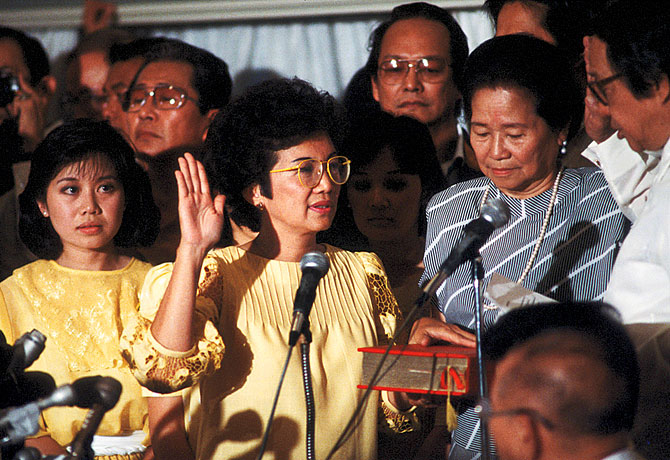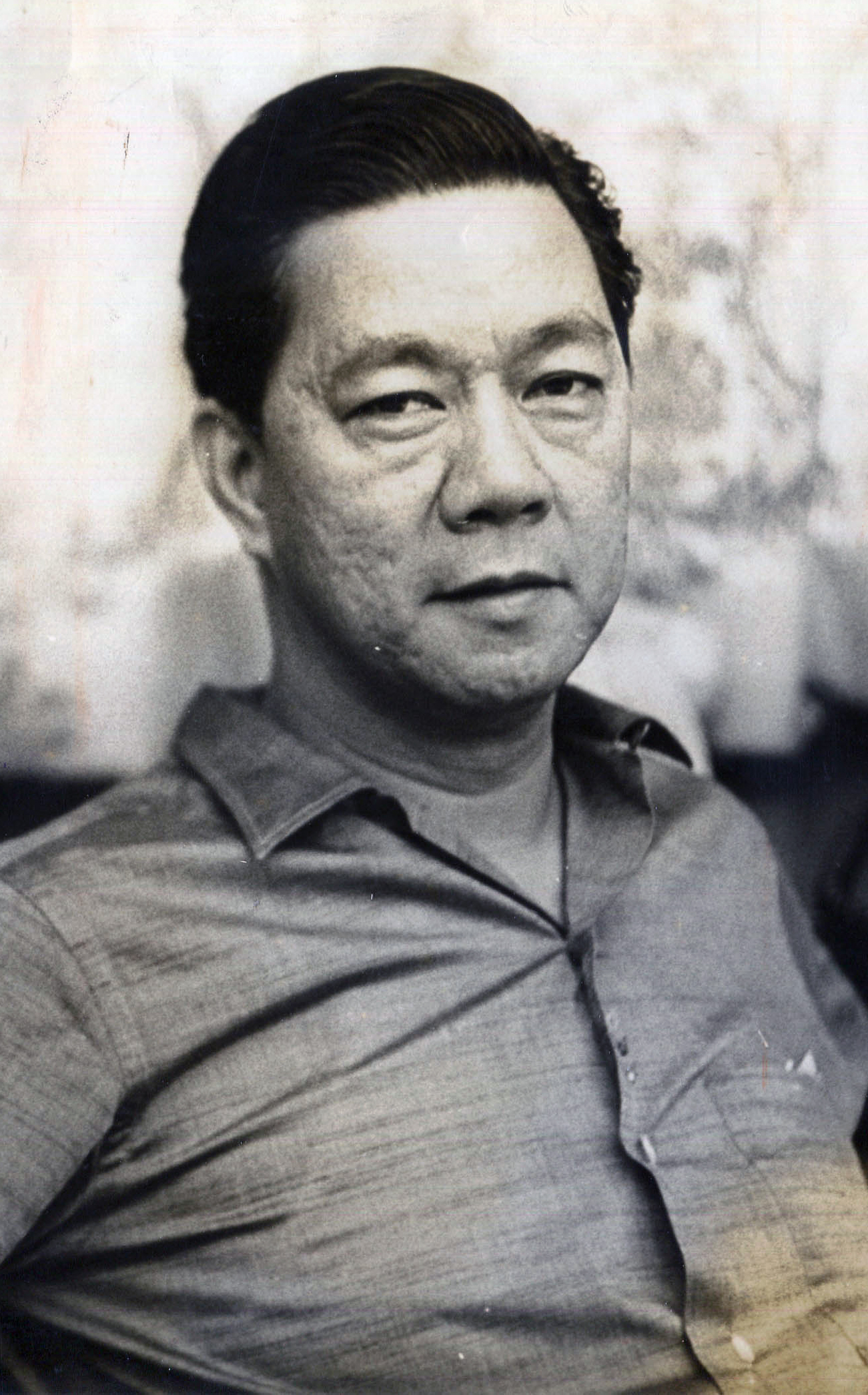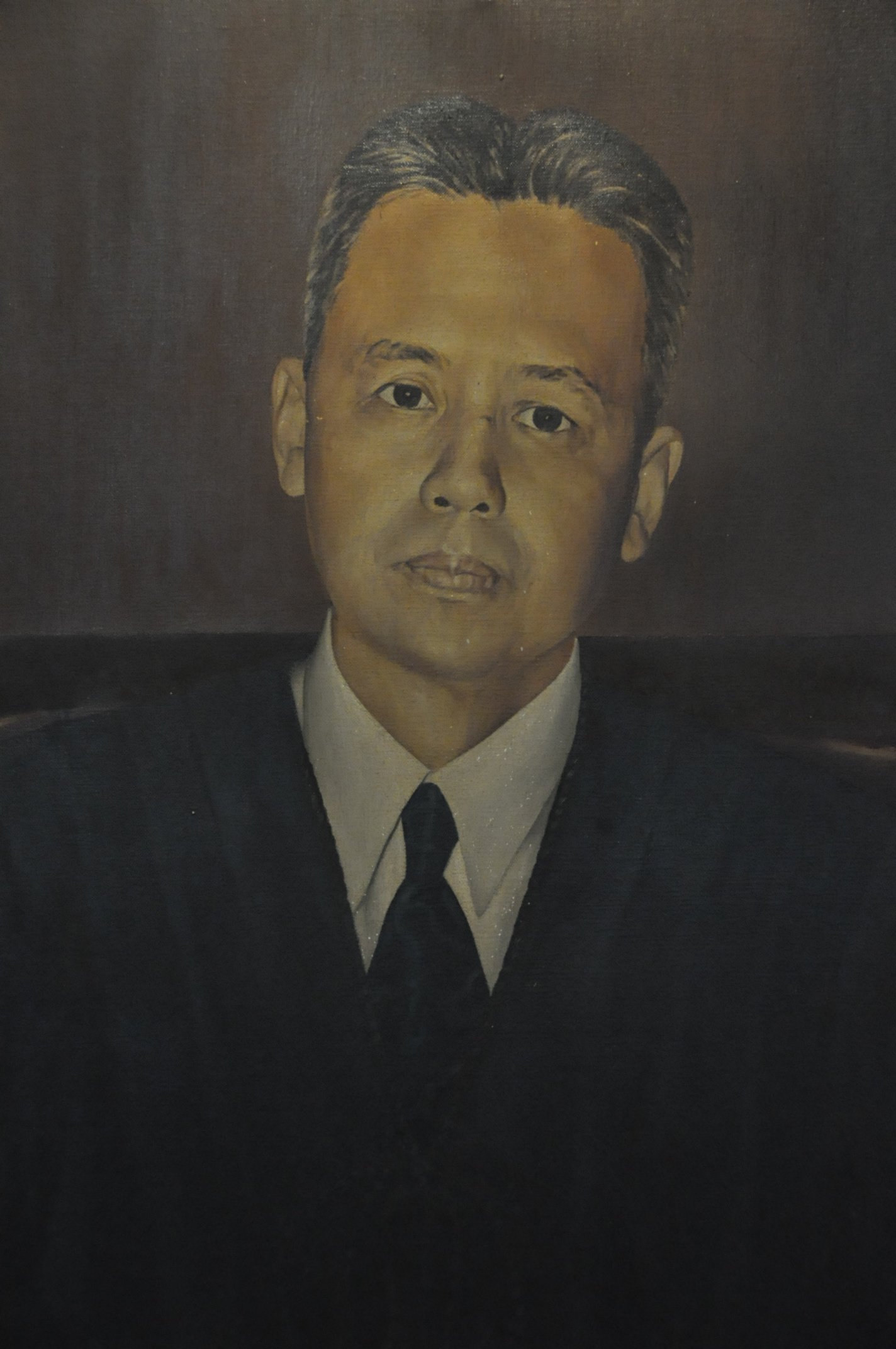|
Assassination Of Benigno Aquino, Jr.
Benigno "Ninoy" Aquino Jr., a former Philippine senator, was assassinated on Sunday, August 21, 1983, on the tarmac of Manila International Airport (now named Ninoy Aquino International Airport in his honor). A longtime political opponent of President Ferdinand Marcos, Aquino had just landed in his home country after three years of self-imposed exile in the United States when he was shot in the head while being escorted from an aircraft to a vehicle that was waiting to transport him to prison. Also killed was Rolando Galman, who was falsely accused of Aquino's murder. Aquino was elected to the Philippine Senate in 1967 and was critical of Marcos. He was imprisoned on trumped up charges shortly after Marcos's 1972 declaration of martial law. In 1980, he had a heart attack in prison and was allowed to leave the country two months later by Marcos' wife, Imelda. He spent the next three years in exile near Boston before deciding to return to the Philippines. Aquino's assassination ... [...More Info...] [...Related Items...] OR: [Wikipedia] [Google] [Baidu] |
People Power Revolution
The People Power Revolution, also known as the EDSA Revolution or the February Revolution, was a series of popular demonstrations in the Philippines, mostly in Metro Manila, from February 22 to 25, 1986. There was a sustained campaign of civil resistance against regime violence and electoral fraud. The nonviolent revolution led to the departure of Ferdinand Marcos, the end of his 20-year dictatorship and the restoration of democracy in the Philippines. It is also referred to as the Yellow Revolution due to the presence of yellow ribbons during demonstrations (in reference to the Tony Orlando and Dawn song "Tie a Yellow Ribbon Round the Ole Oak Tree") as a symbol of protest following the assassination of Filipino senator Benigno "Ninoy" Aquino, Jr. in August 1983 upon his return to the Philippines from exile. It was widely seen as a victory of the people against two decades of presidential rule by President Marcos, and made news headlines as "the revolution that surprised ... [...More Info...] [...Related Items...] OR: [Wikipedia] [Google] [Baidu] |
Corazon Aquino
Maria Corazon "Cory" Sumulong Cojuangco-Aquino (; ; January 25, 1933 – August 1, 2009) was a Filipina politician who served as the 11th president of the Philippines from 1986 to 1992. She was the most prominent figure of the 1986 People Power Revolution, which ended the two-decade rule of President Ferdinand Marcos and led to the establishment of the current democratic Fifth Philippine Republic. Corazon Aquino was married to Senator Benigno Aquino Jr., who was one of the most prominent critics of President Marcos. After the assassination of her husband on August 21, 1983, she emerged as leader of the opposition against the president. In late 1985, Marcos called for a snap election, and Aquino ran for president with former Senator Salvador Laurel as her running mate for vice president. After the election held on February 7, 1986, the Batasang Pambansa proclaimed Marcos and his running mate Arturo Tolentino as the winners, which prompted allegations of electoral fra ... [...More Info...] [...Related Items...] OR: [Wikipedia] [Google] [Baidu] |
Political Party
A political party is an organization that coordinates candidates to compete in a particular country's elections. It is common for the members of a party to hold similar ideas about politics, and parties may promote specific ideological or policy goals. Political parties have become a major part of the politics of almost every country, as modern party organizations developed and spread around the world over the last few centuries. It is extremely rare for a country to have no political parties. Some countries have only one political party while others have several. Parties are important in the politics of autocracies as well as democracies, though usually democracies have more political parties than autocracies. Autocracies often have a single party that governs the country, and some political scientists consider competition between two or more parties to be an essential part of democracy. Parties can develop from existing divisions in society, like the divisions betwee ... [...More Info...] [...Related Items...] OR: [Wikipedia] [Google] [Baidu] |
Martyr
A martyr (, ''mártys'', "witness", or , ''marturia'', stem , ''martyr-'') is someone who suffers persecution and death for advocating, renouncing, or refusing to renounce or advocate, a religious belief or other cause as demanded by an external party. In the martyrdom narrative of the remembering community, this refusal to comply with the presented demands results in the punishment or execution of an actor by an alleged oppressor. Accordingly, the status of the 'martyr' can be considered a posthumous title as a reward for those who are considered worthy of the concept of martyrdom by the living, regardless of any attempts by the deceased to control how they will be remembered in advance. Insofar, the martyr is a relational figure of a society's boundary work that is produced by collective memory. Originally applied only to those who suffered for their religious beliefs, the term has come to be used in connection with people killed for a political cause. Most martyrs are consid ... [...More Info...] [...Related Items...] OR: [Wikipedia] [Google] [Baidu] |
Capital Punishment
Capital punishment, also known as the death penalty, is the state-sanctioned practice of deliberately killing a person as a punishment for an actual or supposed crime, usually following an authorized, rule-governed process to conclude that the person is responsible for violating norms that warrant said punishment. The sentence ordering that an offender is to be punished in such a manner is known as a death sentence, and the act of carrying out the sentence is known as an execution. A prisoner who has been sentenced to death and awaits execution is ''condemned'' and is commonly referred to as being "on death row". Crimes that are punishable by death are known as ''capital crimes'', ''capital offences'', or ''capital felonies'', and vary depending on the jurisdiction, but commonly include serious crimes against the person, such as murder, mass murder, aggravated cases of rape (often including child sexual abuse), terrorism, aircraft hijacking, war crimes, crimes against ... [...More Info...] [...Related Items...] OR: [Wikipedia] [Google] [Baidu] |
Military Tribunal
Military justice (also military law) is the legal system (bodies of law and procedure) that governs the conduct of the active-duty personnel of the armed forces of a country. In some nation-states, civil law and military law are distinct bodies of law, which respectively govern the conduct of civil society and the conduct of the armed forces; each body of law has specific judicial procedures to enforce the law. Among the legal questions unique to a system of military justice are the practical preservation of good order and discipline, command responsibility, the legality of orders, war-time observation of the code of conduct, and matters of legal precedence concerning civil or military jurisdiction over the civil offenses and the criminal offenses committed by active-duty military personnel. Military justice is different and distinct from martial law, which is the imposition of direct military authority upon a civilian population, in place of the civilian legal system o ... [...More Info...] [...Related Items...] OR: [Wikipedia] [Google] [Baidu] |
Hunger Strike
A hunger strike is a method of non-violent resistance in which participants fast as an act of political protest, or to provoke a feeling of guilt in others, usually with the objective to achieve a specific goal, such as a policy change. Most hunger strikers will take liquids but not solid food. In cases where an entity (usually the state) has or is able to obtain custody of the hunger striker (such as a prisoner), the hunger strike is often terminated by the custodial entity through the use of force-feeding. Early history Fasting was used as a method of protesting injustice in pre-Christian Ireland, where it was known as ''Troscadh'' or ''Cealachan''. Detailed in the contemporary civic codes, it had specific rules by which it could be used. The fast was often carried out on the doorstep of the home of the offender. Scholars speculate that this was due to the high importance the culture placed on hospitality. Allowing a person to die at one's doorstep, for a wrong of whi ... [...More Info...] [...Related Items...] OR: [Wikipedia] [Google] [Baidu] |
1967 Philippine Senate Election
A senatorial election was held on November 14, 1967, in the Philippines. The 1967 election for the members of the Philippine Senate were also known as the 1967 midterm election, as the date where the elected candidates take office falls halfway through President Ferdinand Marcos' four-year term. The administration Nacionalista Party won seven seats in the Philippine Senate while the Liberal Party won one seat; the Nacionalistas got the majority in the Senate after having twelve of the 24 seats in the Senate prior to the election. Retiring incumbents Liberal Party Both were originally elected under the Progressive Party banner in 1961. # Manuel Manahan # Raul Manglapus Nacionalista Party # Lorenzo Sumulong Mid-term vacancies # Gaudencio Antonino (Nacionalista), died on November 13, 1967 Results The Nacionalista Party won seven seats, while the Liberal Party won one. Jose Roy of the Nacionalistas garnered the highest number of votes and was the sole incumbent to defend hi ... [...More Info...] [...Related Items...] OR: [Wikipedia] [Google] [Baidu] |
Commutation Of Sentence
In law, a commutation is the substitution of a lesser penalty for that given after a conviction for a crime. The penalty can be lessened in severity, in duration, or both. Unlike most pardons by government and overturning by the court (a full overturning is equal to an acquittal In common law jurisdictions, an acquittal certifies that the accused is free from the charge of an offense, as far as criminal law is concerned. The finality of an acquittal is dependent on the jurisdiction. In some countries, such as the ...), a commutation does not affect the status of a defendant's underlying criminal conviction. Although the concept of commutation may be used to broadly describe the substitution of a lesser criminal penalty for the original sentence, some jurisdictions have historically used the term only for the substitution of a sentence of a different character than was originally imposed by the court. For example, the substitution of a sentence of parole for the origina ... [...More Info...] [...Related Items...] OR: [Wikipedia] [Google] [Baidu] |
Pardon
A pardon is a government decision to allow a person to be relieved of some or all of the legal consequences resulting from a criminal conviction. A pardon may be granted before or after conviction for the crime, depending on the laws of the jurisdiction. Pardons can be granted in many countries when individuals are deemed to have demonstrated that they have "paid their debt to society", or are otherwise considered to be deserving of them. In some jurisdictions of some nations, accepting a pardon may ''implicitly'' constitute an admission of guilt; the offer is refused in some cases. Cases of wrongful conviction are in recent times more often dealt with by appeal rather than by pardon; however, a pardon is sometimes offered when innocence is undisputed in order to avoid the costs that are associated with a retrial. Clemency plays a critical role when capital punishment exists in a jurisdiction. Pardons are sometimes seen as a mechanism for combating corruption, allowing a par ... [...More Info...] [...Related Items...] OR: [Wikipedia] [Google] [Baidu] |
Supreme Court Of The Philippines
The Supreme Court ( fil, Kataas-taasang Hukuman; colloquially referred to as the ''Korte Suprema'' lso used in formal writing is the highest court in the Philippines. The Supreme Court was established by the Second Philippine Commission on June 11, 1901 through the enactment of its Act No. 136, an Act which abolished the '' Real Audiencia de Manila'', the predecessor of the Supreme Court. The Supreme Court compound, which sits in what is formerly a part of the University of the Philippines Manila campus, occupies the corner of Padre Faura Street and Taft Avenue in Ermita, Manila, with the main building directly in front of the Philippine General Hospital’s cancer institute. History Pre-hispanic period Prior to the conquest of Spain, the islands of the Philippines were composed of independent barangays, each of which is community composed of 30 to 100 families. Typically, a barangay is headed by a ''datu'' or a local chief who exercises all functions of government—exec ... [...More Info...] [...Related Items...] OR: [Wikipedia] [Google] [Baidu] |
Life Imprisonment
Life imprisonment is any sentence of imprisonment for a crime under which convicted people are to remain in prison for the rest of their natural lives or indefinitely until pardoned, paroled, or otherwise commuted to a fixed term. Crimes for which, in some countries, a person could receive this sentence include murder, torture, terrorism, child abuse resulting in death, rape, espionage, treason, drug trafficking, drug possession, human trafficking, severe fraud and financial crimes, aggravated criminal damage, arson, kidnapping, burglary, and robbery, piracy, aircraft hijacking, and genocide, crimes against humanity, war crimes or any three felonies in case of three-strikes law. Life imprisonment (as a maximum term) can also be imposed, in certain countries, for traffic offences causing death. Life imprisonment is not used in all countries; Portugal was the first country to abolish life imprisonment, in 1884. Where life imprisonment is a possible sentence, ther ... [...More Info...] [...Related Items...] OR: [Wikipedia] [Google] [Baidu] |









